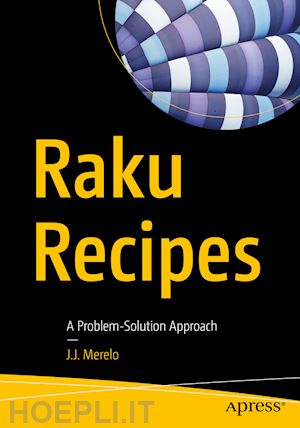

Questo prodotto usufruisce delle SPEDIZIONI GRATIS
selezionando l'opzione Corriere Veloce in fase di ordine.
Pagabile anche con Carta della cultura giovani e del merito, 18App Bonus Cultura e Carta del Docente
Explore Raku problems and solutions using the latest version of the Raku programming language. In Raku Recipes, the emphasis is on applying Raku code to various important tasks and applications including data science, analytics, microservices, and desktop/console applications. There are also fun one-liner script recipes and instructions on how to create mini-languages of your very own.
All in all, over 70 recipes cover a broad range of the tasks and problems encountered by a modern Raku developer. You’ll be able to solve problems starting from basics such as input/output and math, to more complex domains such as microservices web sockets, web hooks, and mini-bots.Who This Book Is For
While some prior experience in Raku may be useful, it is not required. Prior programming experience using other scripting languages, such as Perl, is recommended, however.











Il sito utilizza cookie ed altri strumenti di tracciamento che raccolgono informazioni dal dispositivo dell’utente. Oltre ai cookie tecnici ed analitici aggregati, strettamente necessari per il funzionamento di questo sito web, previo consenso dell’utente possono essere installati cookie di profilazione e marketing e cookie dei social media. Cliccando su “Accetto tutti i cookie” saranno attivate tutte le categorie di cookie. Per accettare solo deterninate categorie di cookie, cliccare invece su “Impostazioni cookie”. Chiudendo il banner o continuando a navigare saranno installati solo cookie tecnici. Per maggiori dettagli, consultare la Cookie Policy.